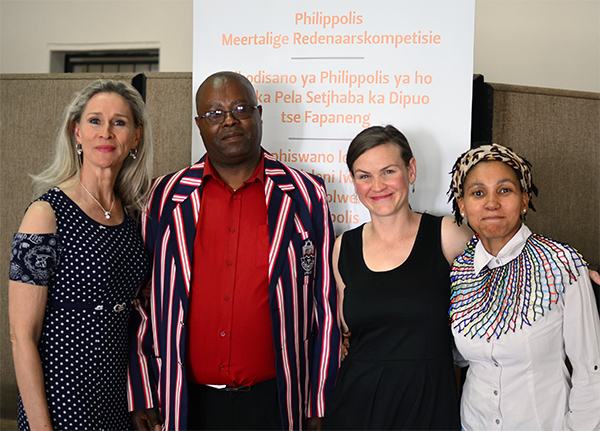Latest News Archive
Please select Category, Year, and then Month to display items
06 November 2023
|
Story MBALI MABOEA
|
Photo SUPPLIED
 The Department of Geography on the UFS Qwaqwa Campus recently played host to the Society of South African Geographers Conference (SSAG 2023), which gathered more than 100 students over three days.
The Department of Geography on the UFS Qwaqwa Campus recently played host to the Society of South African Geographers Conference (SSAG 2023), which gathered more than 100 students over three days.
Fostering academic growth, collaboration, and inspiration among students and researchers in the field of geography, the Department of Geography on the UFS Qwaqwa Campus recently played host to the Society of South African Geographers Conference (SSAG 2023), which gathered more than 100 students over three days.
Following a five-year hiatus, the three-day conference comprised student proposal presentations in different fields: human geography, environment geography, geoinformatics, and physical geography, divided into breakaway sessions over two days. Furthermore, day three of the annual conference included an excursion to the Basotho Cultural Village and Clarens.
The three-day annual student conference focused on different themes presented by two main speakers. The topic of the first keynote speaker, Dr Mahlomola Daemane, General Manager of the SANParks Arid Research Unit, focused on the contemporary conservation, transition, and relevance of science in policy and decision making.
The second keynote speaker was Dr Felicia Akinyemi, a Marie Sklodowska-Curie Research Fellow affiliated with the Institute of Geography at the University of Bern in Switzerland. Her work focuses on the intersection of geoinformatics, global change, and sustainability. Dr Akinyemi focused her talk on the integrative geospatial methods and metrics for sustainable land use. She introduced different techniques and metrics and gave students insight in early-career African research.
Speaking about the success of the conference, Nthebohiseng Sekhele, Geography Lecturer on the Qwaqwa Campus and chair of the organising committee, said, “The local organising committee was also very impressed with the quality of presentations from our postgraduate students in Geography, as well as the robust discussions that happened during the parallel sessions in the two days of the conference. We had a positive response of physical and online participation from many universities across South Africa. We are pleased that we have achieved our goal with this conference, which is to inspire the next generation of geographers.”
Competition emphasises value of mother-tongue education
2017-11-02

At the recent Multilingual Debating Competition were, from the left: Anita Muller,
local facilitator; William Magwa, master of ceremonies; Dr Chrismi-Rinda Loth,
project coordinator in the Unit for Language Facilitation and Empowerment; and
Mabatho Ntsieng, project facilitator in Community Engagement.
Photo: Supplied
The Multilingual Public Speaking Competition has been an annual event in Philippolis since 2013. The competition was established as a result of the Multilingual Information Development Programme (MIDP), a project sponsored by the province of Antwerp in Flanders, Belgium.
The competition is jointly hosted by the Unit for Language Facilitation and Empowerment (ULFE) at the University of the Free State (UFS) and the Department of Community Engagement, also from the UFS.
Debating in your home language
Grade 6 to 9 learners from four schools participated in this year’s competition. Bergmanshoogte Intermediate School, Madikgetla Primary School, Williamsville Primary School, and Springfontein Primary School each entered their three best speakers per grade.
Olerato Tshiloane, a Grade 7 learner from Madikgetla Primary School, was named best speaker overall.
Everyone debated on ‘Heritage’
The overall theme of this annual event was ‘Heritage’. Thirty six learners debated in their mother tongue on aspects of this theme, such as its definition, the role it plays in their lives, and the importance thereof. According to Dr Chrismi-Rinda Loth from ULFE, learners have to present their speeches in their mother tongues. “This emphasises the value of the mother tongue/home language within a teaching context,” she says.
This year’s competition saw 20 Afrikaans speeches, 13 in Sesotho, and three in isiXhosa. The multilingual adjudication panel was composed of teachers from the participating schools, and the head adjudicator from the Afrikaanse Taal- en Kultuurvereniging (ATKV). The ATKV is a partial sponsor of the competition and also provides the participation certificates.
Dr Loth says ULFE and Community Engagement are looking forward to continue their collaboration, thus contributing to the empowerment of the community.